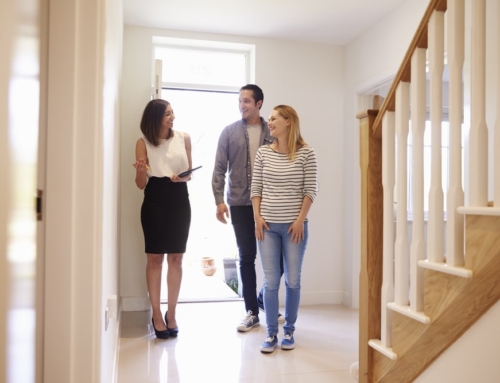Q: My husband and I bought our house in the North Cumming, GA area in June 2000 for $214,000.; Right now we are faced with having to move out of state and are concerned we are going to lose our shirt on this house, since we’ve only been in the house for 6 months. It’s in a growing area, the houses are going pretty fast and the builders are getting ready to start a new phase in our subdivision. We put a down payment of $13,000 and we have a 30-year/5-ARM loan of 7.5%. Also, we’ve put at least $2,000 into the house already with blinds, fans, garage door opener, garbage disposal, built-in microwave, shrubs and grass seed. We plan to put the house up for sale in early February and hope to be out by early summer, if not sooner.
We don’t want to rent but we do have family within 40 minutes who could manage the house if we decided to rent it out, however, we would rather be free and clear of the house rather than rent.
What do you recommend we do…rent or sell? How much should we sell for (asking and bottom line price)? Are we going to lose our shirt on this deal? Should we use an agent or try to sell ourselves?
A: I can’t advise you on how much to sell your home for. That depends on the price builders in the area are getting for their new homes. You’re in a tough bind (not that you don’t know it) and you’re going to have to gauge the demand for an almost new house that comes along with a few niceties, like grass and window treatments.
The biggest plus is that someone can “MOVE RIGHT IN”, whereas developers and builders may be running behind schedule. My sister moved from Atlanta last year just 4 months after moving into her brand new home. She had her agent work with the developer’s agent to send people her way who wanted a new home in that subdivision, but wanted it NOW. And one of those couples actually bought the house within weeks of it being listed.
I suggest you make friends with the agents who work for the developer. Tell them you will pay them a half commission (2.5-3%) if they send buyers your way and one of their buyers actually purchases your home. A half commission is far cheaper than a whole commission, though you will have to hire an attorney or escrow company to help you close.
Q: How do I determine how much to sell my house for if I am selling the home myself?
If I only have 10 percent down payment, should I get a piggyback loan?
A: Selling your home yourself is a huge undertaking. You need to do the job of a seller AND the broker, all at the same time.
Before deciding to sell on your own, you should talk to three brokers from three different firms and ask them to put together a comparative marketing analysis. This CMA will include a suggested list price.
If you want to try marketing your home yourself after you receive your CMAs, fine. But give yourself only a limited amount of time in which to get an offer, say 3 weeks. Then, hire a professional.
If you want to find out how much your home is worth without going through an agent, you can hire an appraiser. The cost will be approximately $300-$400, depending on where you live and how much work the appraiser has to do.
Finally, if you’re set on selling yourself, consider using a discount broker, like www.owners.com. For a $499 fee, they will list your home in the local Multiple Listing Service. You will still owe a half commission to the broker who brings the buyer to your door.
Q: I’ve been scouring your site for information on how to find an appraiser for our house and have been unsuccessful. We live in Roswell, GA and are wanting to sell our current home and buy another, larger one. To help us determine the amount we can afford for a new home, we want to get the appraisal value for our current home. Our questions are:
How do we go about finding a good appraiser?
What questions should we ask the candidate appraiser to determine if we should use him/her?
About how much should we expect to pay for an appraisal and on what is the price based?
A: I don’t understand why you need an appraisal. If you’re going to sell through an agent, have 3 agents come through your home and do a comparative marketing analysis. They will give you a suggested list price based on the sales price of comparable homes in the area.
That’s really all you need. I talk about this at length in my book, 100 Questions Every Home Seller Should Ask.
Q: I listen to your real estate advice often on the Clark Howard Show. We are currently trying to sell our home by owner. I was wondering what your recommendation would be for a good listing website for by owner home sales. I saw two listed on your site, www.ByOwnerSales.com and www.Owners.com. Which of these, if any would be your preferred internet listing source. We do not want to be locked into a contract or substantial commissions. Your reply would be greatly appreciated. If it makes any difference on the sites our home is currently advertised for $279,900.00.
A: www.Owners.com is the original FSBO site, and I think it’s fairly well run. But there are other places to go as well. I’d start at Owners and see if it offers what you want and then explore from there.
Q: My husband I and have recently divorced (amicably). The house we both shared and I currently live in was purchased in 1978. The mortgage is in his name, but the deed(?) is in both our names. In the divorce decree, I was granted 100% ownership of the house.
I plan to move this summer to Oregon and I want to sell the house. How does having my ex-husband’s name only on the mortgage affect me selling the house? What steps should I follow to ensure that the right names are on the right official documents so that I can sell the house?
A: You will need the help of a real estate attorney. Your husband will have to sign off on his rights to the cash from the home. I’m sure the house has been pledged as collateral for the loan, but you’ll want to make sure you get the rest of the cash.
Although residential transactions in Georgia usually happen without an attorney, I again advise you to consult with one before you proceed so you know what to do to protect yourself and your asset.
Q: I just signed a contract to sell my house for $130,000. I thought I was doing pretty good considering that the balance on the mortgage is $120,299.
However I am just realizing all of the items I am going to have to pay for at closing. I am afraid I will not have the money to meet my closing costs. Is there anything I can do?
A: There’s very little you can do. You need to sit down and work out your closing costs to see where you are. If you don’t have enough to close, you’ll have to dip into your own pocket to pay these costs. If you don’t have it, then you’ll need to talk to the lender about doing short sale (which will negatively impact your credit) or cancel your sale.
I’m sorry I don’t have better news.
Q: My husband I and have recently divorced (amicably). The house we both shared and I currently live in was purchased in 1978. The mortgage is in his name, but the deed(?) is in both our names. In the divorce decree, I was granted 100% ownership of the house.
I plan to move this summer to Oregon and I want to sell the house. How does having my ex-husband’s name only on the mortgage affect me selling the house? What steps should I follow to ensure that the right names are on the right official documents so that I can sell the house?
A: You will need the help of a real estate attorney. Your husband will have to sign off on his rights to the cash from the home. I’m sure the house has been pledged as collateral for the loan, but you’ll want to make sure you get the rest of the cash.
Although residential transactions in Georgia usually happen without an attorney, I again advise you to consult with one before you proceed so you know what to do to protect yourself and your asset.
Q: My wife and I purchased a home in a very nice neighborhood 15 months ago. This is new construction and we have a $114,000 mortgage, with the value being $155,000. We need to refinance the original balloon mortgage soon and I would like to know about using some of our equity to build a deck on the back and replace the carpet in the main floor with wood flooring (i.e. Pergo, Armstrong, etc.). Is this going to have a reasonable payback when we sell in about 10 – 15 years? Will this increase our home value? I realize that this will increase our home enjoyment, but I am not sure about the money part.
A: You should be able to recoup most of your money, if not all, over the next 10 to 15 years. Wood floors (pergo isn’t wood, it’s fake wood, but you probably knew that) are very popular with home buyers, as are decks. If you want to know about the return on investment, contact the agent who sold you the house and ask him or her to run some "comps" (recent sales figures of comparable homes in your neighborhood) to see what homes with wood floors and decks are selling for.
Q: One week before closing, our buyer backed out then sent us a letter asking for a three week extension and a $5,000 credit. His reason was that he had to lower the price of the home he is selling. The sale of his home was not a contingency in his purchase of our home. We refused to issue him the credit because we are downsizing and simply didn’t have the money to give him. No extension was given either. All of the agents involved pressured us and after 9 days of going back and forth we reached our breaking point and decided the deal was off on our house, as well as on the home we were going to purchase. That contract did have a contingency in it- that our house sell in order for us to buy this home. Two days after we said we were finished, a deal was suddenly struck in which the buyer agreed to adhere to the original contract. This was also two days after the original closing date had passed which the buyer breached. We had already made our decision, hired a lawyer and had set a date for mediation. Are we still required to go through with both deals?
A: It depends on what your contract said. If your contract had specific dates by which the contingencies had to be satisfied (i.e., the date you had to sell your home), then probably not. If your buyer and you agreed not to move ahead, and then at the last minute he came back, your contract probably had been terminated.
You need to seek the advice of a real estate attorney who can look at your documents and give you the proper advice.
Q: Please help. I have 2 parcels of land–both inherited when my father died. One is 5 1/2 acres and the other 6 1/2. On one is a house my Dad actually built with help from friends in the 50’s (not super fancy–just functional. On the other is an old wood farm house (in which I live) dating back to the 1910’s. It has been bricked over and remodeled inside many times. I am worried about never being able to invest enough time and money to get it up to code.
These two parcels are across the road from each other. And one of the parcels has road frontage on the back side as well. There are many subdivisions on the road that date from the 70’s to new construction.
My question: I want to find a developer and sell it all at once. Is this a good idea? I’m afraid that I would be just “throwing away” the value of the houses. Is there a special way to set a price in this situation? Can you offer any thoughts?
A: Your question depends so much on location, and the demand for new housing in your area. When you sell for land value, you have to not think about what value there is, if any, in your home. Creating a subdivision means starting from scratch.
You need to talk with a couple of agents who specialize in land sales to developers in your area. See what kind of money you could get for the parcels and then decide if it’s worth it to sell or if you should keep the land for a few more years until the market in your area gets really hot.
Finally, you may wish to speak to a real estate attorney who specializes in land sales and development. I hope this gives you a little bit of guidance. I’ll be in Atlanta next week for Managing Your Money. Hope to see you there.
Q: We are going to sell our house ourselves and I have a question about the carpet. Our house is 7 years old we are raising 3 kids, it has very noticeable stains. We don’t want to change it ourselves. On the flyer that we’re making, should I state that we are offering a carpet allowance? Or should I just wait for the prospective buyers to ask about it when they come to view the house?
Which one of your books should I purchase, to guide us thru the “For Sale by Owner” process?
A: I wouldn’t give anything away up front. Try to have your carpet professionally cleaned (or buy some RESOLVE! carpet cleaner — works wonders and I have 2 little kids, too) and then see how bad it really is. If the carpet is horrible, then consider replacing the parts that are the worst with something inexpensive that looks good. You may be able to increase your sales price by way more than the cost of the carpet.
For example, my sister and her husband just spend about $5,000 to fix up his place. New carpet from Home Depot ($2,000), white paint on the inside and outside of the house, new plastic floor tile (he laid it himself), and me to help dig up and replant the garden.
They were able to net an additional $25,000 in the sales price of the house because it looked pristine.
Pick up a copy of 100 Questions Every Home Seller Should Ask (try to get the version with the new tax information inside — that’s the one www.Amazon.com has, and you can get there from this website, some information on selling by owner but with all the other important seller information. Also, check out my website for columns on being a FSBO.
Q: I have a home I want to sell and have been offered an unconventional deal by an interested party. The home will be a fixer upper and my motivation is to sell home as is.
The buyer has proposed that they will purchase the home under what is called “buying subject to existing mortgage”. At closing, the warranty deed transfers to the buyers, but the security deed remains with me so I as the seller would still be legally liable for the loan.
The buyers however, would take over the mortgage payments and management of the property, insurance , etc They plan to fix up the home to prepare for sale. Would most likely lease with option to buy for 2 yrs and then sell. At time of sell, the mortgage that I hold would be paid off.
Have you ever heard of this and what do you think?
A: Let’s see. You’re going to give up control of the property. Then, you’re going to actually turn title over the the new buyers. But, you are going to still be legally liable for the mortgage.
I’m guessing that this is the deal and I’m also guessing your mortgage company won’t go for it.
Instead, let me propose this: They take a non-refundable lease with an option to buy the property for a year. They pay you something down, say $1,000 or $2,000 which they won’t get back. Then, they rent the property from you for 6 months while they fix it up. Their option entitles them to buy the property at a certain price, let’s say $100,000. The “Rent” they pay you covers your costs (mortgage, taxes insurance) and they pay utilities. At the end of the year, they can purchase the property for the pick-up price (specified in the original contract to purchase, and the rent and option money becomes their "equity" in the property, part of the down payment.
In the first scenario, you’re taking a huge risk and funding them. In the second scenario, you’re protected. You maintain ownership of the property and they take the risk.
I’m guessing they won’t like the second scenario. So let’s propose a third: They simply buy the property outright from you. If they want, and you agree, you can take back the first mortgage and charge them interest.
With any of these scenarios, you’ll need an attorney to draw up the documentation and make sure everything gets filed as it should. Good luck. I hope it works out.
Q: Can you tell me if the seller of a home normally pays the closing cost?
A: Sellers normally pay their own closing costs, including the brokerage commission, transfer taxes (where applicable), etc. In fact, there’s a list of about 22 different closing fees and costs that the seller might have to pick up in my book, 100 Questions Every Home Seller Should Ask.
If you’re asking if the seller must pick up the buyer’s closing costs, the answer is no.
Q: I am considering selling a home as a FSBO. Can you recommend a guide or book that can walk me through the process so I can evaluate whether or not I want to do this, and that I can use to do it if I decide to? Thanks.
A: I don’t know of a book that really explains the FSBO process well. To decide whether or not you want to do this, I’d advise you to read a really good book about home selling first. My book, 100 Questions Every Home Seller Should Ask, is currently being reprinted, but you might find it at your local library. Otherwise, try a dummy book or one written by Robert Irwin.
When you decide to sell on your own, you’re essentially doing the jobs of the seller AND the real estate agent. If you’re in a hot building, or hot neighborhood, and your property looks great, you shouldn’t have too much trouble selling on your own. But if you live in a house that isn’t finished, ask too much money for the property, live in a strange neighborhood, etc., then you may want to hire a broker to make the process easier.
I have a few articles on being a FSBO on my website, www.thinkglink.com. I urge you to check them out.






Leave A Comment